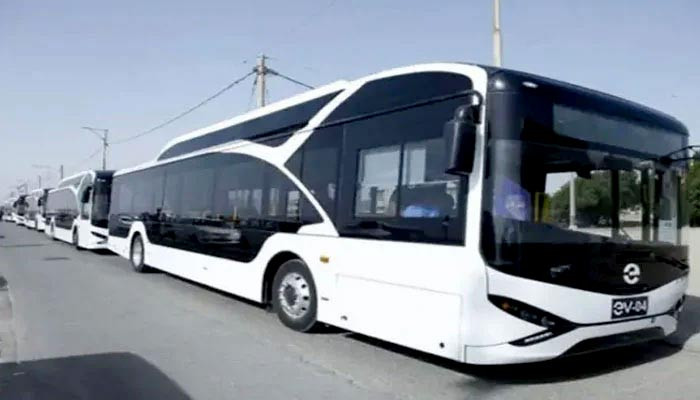Sindh Approves Electric Buses and Expressway Projects
Under the leadership of Sindh Chief Minister Syed Murad Ali Shah, the Public-Private Partnership Policy Board convened its 48th meeting at CM House on Friday, where significant infrastructure and public service projects were given the green light. These include the procurement of 500 electric buses for Karachi and Hyderabad and the construction of an elevated expressway linking Karachi Port with Qayyumabad.
The board also agreed to adopt a fixed-and-variable cost annuity model for Regional Blood Centres (RBCs) located in Sukkur, Karachi, and Shaheed Benazirabad.
The session saw the participation of provincial ministers, the chief secretary, the CM’s principal secretary, the Planning and Development Board chairman, the Public-Private Partnership Unit director general, the transport secretary, and other key officials.
Electric Bus Project
The Peoples Green Transport Project, utilizing a public-private partnership approach, was approved to introduce a substantial fleet of electric buses to Karachi and Hyderabad. The board gave its approval to the project’s scope, structure, and risk assessment. An amended unsolicited proposal from a private firm was accepted, granting it the right of first refusal and exemption from the prequalification stage. Authorities were given the go-ahead to begin the investor solicitation process to bring in a private partner.
The project includes the phased deployment of 500 electric buses, along with the development of depots, charging stations, bus shelters, and an automated fare collection and intelligent transport management system. With a 12-year concession period, the project aims to serve over 200,000 commuters daily, integrate with the Green Line BRT, and considerably enhance urban mobility. The board highlighted the initiative as a major stride toward a cleaner and more efficient public transport system in Sindh.
Karachi Port Elevated Expressway
The development of the Karachi Port to Qayyumabad (Jam Sadiq Interchange) Elevated Expressway Project was also approved under a public-private partnership.
The Chief Minister instructed the PPP board to expedite the necessary paperwork to facilitate the project’s groundbreaking ceremony. The board approved the project scope, transaction structure, and risk evaluation, and authorized competitive bidding for the unsolicited proposal.
This project encompasses the design, financing, and construction of a 16.5-kilometer, four-lane elevated freight expressway connecting the Karachi Port (East Wharf) to the Jam Sadiq Interchange. This expressway is projected to shorten travel distance by 26 kilometers, enable round-the-clock heavy traffic flow, alleviate congestion on city roads, and boost port efficiency and connectivity with the M-9 and Shahrah-e-Bhutto highways.
Design modifications were also approved to align with the Yellow Line BRT, include mixed-traffic ramps, enhance port connectivity, and minimize land acquisition. Under the DBFOT user-pay model, the Sindh government will offer capital and operational VGF, including a minimum revenue guarantee for a decade.
Regional Blood Centres
The adoption of a fixed and variable cost-based annuity model was approved for Regional Blood Centres (RBCs) in Sukkur, Karachi, and Shaheed Benazirabad, mirroring the framework previously sanctioned for RBC Jamshoro.
These RBC facilities will now be able to maximize their capacity, potentially issuing approximately 250,000 blood bags annually from each RBC to designated hospital blood banks (HBBs).
Given the high demand for safe blood in government hospitals, this initiative will enable RBCs to fulfill a significant portion of that need. Blood bags will be provided to patients without charge at designated government HBBs.
Other Approvals
The policy board sanctioned PDF funding to engage transaction advisors for feasibility studies and transaction advisory services to outsource radiology and diagnostic lab services at Chandka Medical College Hospital (CMCH), Larkana, and Jinnah Postgraduate Medical Centre (JPMC) Karachi.
The health department aims to implement this project under a public-private partnership to tackle challenges related to the operation and maintenance of advanced diagnostic equipment like MRI, CT scan, digital X-ray, ultrasound, and echocardiography.
Through outsourcing, the private partner would invest in new equipment, ensure operations and maintenance, upgrade outdated systems, deploy trained staff, and reduce turnaround times for test results, thereby guaranteeing patient-focused diagnostic services.
The board reviewed the revised 10th-year operational budget of the Sindh Government Children Hospital, North Karachi, amounting to Rs738.65 million, along with a proposed capital expenditure of Rs95.12 million for the contract’s final year.
Revised budgets and required amendments to the concession agreement were approved to ensure sustained quality service delivery at the hospital.
With the goal of restoring Sindh’s riverine forests to mitigate climate change impacts and lower greenhouse gas emissions in Pakistan, a riverine forestation project across approximately 41,000 hectares in Jamshoro and Matiari districts will be undertaken through a public-private partnership.
The board authorized the forest department to issue letters of award to the preferred bidders for three bidding packages.
The project is anticipated to generate around 35 to 40 million carbon credits, which will be monetized via international carbon markets, leading to substantial foreign exchange earnings.
The board also approved engaging the Asian Development Bank for a feasibility study for a new riverine forestation project covering about 88,000 hectares.
A project was approved under the public-private partnership mode to modernize rice and wheat cultivation and harvesting in Sindh by introducing modern agricultural practices through mechanization, providing farmers with advanced machinery on a rental basis.
The main goal is to boost productivity and improve the overall efficiency of rice and wheat farming. This included approval of PDF funding for a feasibility study to launch the project in the coming months.
The board also approved a feasibility study for establishing a tomato cluster processing project in Thatta district.
Finally, the policy board approved the execution of a concession agreement for the NED Science and Technology Park Project at NED University. This tech park will be a green building and the first university-based science and technology park venture in the country.
An agreement for the project will be signed with Enertech Holding Company, a subsidiary of the Kuwait Investment Authority, under a G2G arrangement in the public-private partnership mode, expected by the end of October 2025.



Comments (0)
No comments yet. Be the first to comment!
Leave a Comment